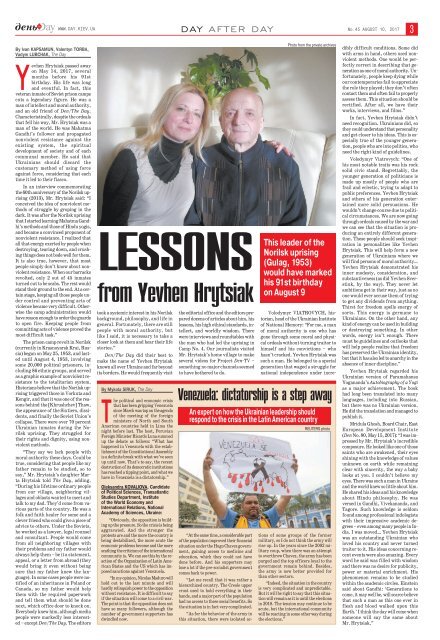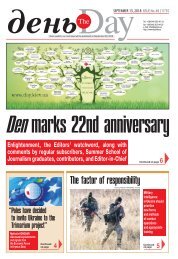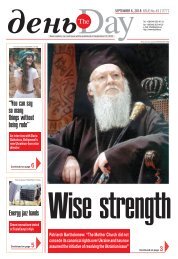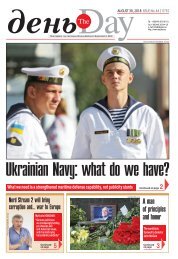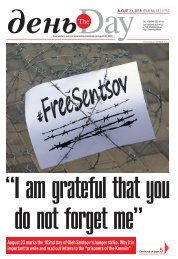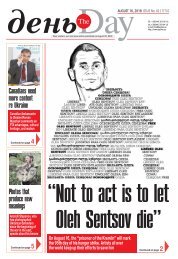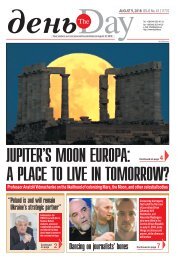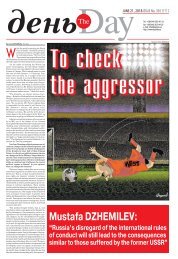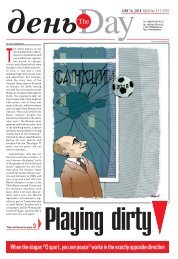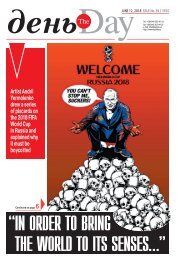Create successful ePaper yourself
Turn your PDF publications into a flip-book with our unique Google optimized e-Paper software.
WWW.DAY.KIEV.UA<br />
DAY AFTER DAY No.45 AUGUST 10, 2017 3<br />
By Ivan KAPSAMUN, Valentyn TORBA,<br />
Vadym LUBCHAK, The Day<br />
Yevhen Hrytsiak passed away<br />
on May 14, 2017, several<br />
months before his 91st<br />
birthday. His life was long<br />
and eventful. In fact, this<br />
veteran inmate of Soviet prison camps<br />
cuts a legendary figure. He was a<br />
man of intellect and moral authority,<br />
and an old friend of Den/The Day.<br />
Characteristically, despite the ordeals<br />
that fell his way, Mr. Hrytsiak was a<br />
man of the world. He was Mahatma<br />
Gandhi’s follower and propagated<br />
nonviolent resistance against the<br />
existing system, the spiritual<br />
development of society and of each<br />
communal member. He said that<br />
Ukrainians should discard the<br />
customary method of using force<br />
against force, considering that each<br />
time it led to their fiasco.<br />
In an interview commemorating<br />
the 60th anniversary of the Norilsk uprising<br />
(2013), Mr. Hrytsiak said: “I<br />
conceived the idea of nonviolent methods<br />
of struggle by groping in the<br />
dark. It was after the Norilsk uprising<br />
that I started learning Mahatma Gandhi’s<br />
methods and those of Hindu yogis,<br />
and became a convinced proponent of<br />
nonviolent resistance. I realized that<br />
all that energy exerted by people when<br />
destroying, tearing down, and crushing<br />
things does not bode well for them.<br />
It is also true, however, that most<br />
people simply don’t know about nonviolent<br />
resistance. When our barracks<br />
revolted, only 2 out of 45 inmates<br />
turned out to be scabs. The rest would<br />
stand their ground to the end. At a certain<br />
stage, keeping all those people under<br />
control and preventing acts of<br />
violence became very difficult. Otherwise<br />
the camp administration would<br />
have reason enough to order the guards<br />
to open fire. Keeping people from<br />
committing acts of violence proved the<br />
most difficult task.”<br />
The prison camp revolt in Norilsk<br />
(currently in Krasnoyarsk Krai, Russia)<br />
began on May 25, 1953, and lasted<br />
until August 4, 1953, involving<br />
some 20,000 political prisoners, including<br />
86 ethnic groups, and served<br />
as a graphic example of nonviolent resistance<br />
to the totalitarian system.<br />
Historians believe that the Norilsk uprising<br />
triggered those in Vorkuta and<br />
Kengir, and that it was one of the reasons<br />
behind the [Khrushchev] Thaw,<br />
the appearance of the Sixtiers, dissidents,<br />
and finally the Soviet Union’s<br />
collapse. There were over 70 percent<br />
Ukrainian inmates during the Norilsk<br />
uprising. They struggled for<br />
their rights and dignity, using nonviolent<br />
methods.<br />
“They say we lack people with<br />
moral authority these days. Could be<br />
true, considering that people like my<br />
father remain to be studied, so to<br />
say,” Mr. Hrytsiak’s daughter Marta<br />
Hrytsiak told The Day, adding,<br />
“During his lifetime ordinary people<br />
from our village, neighboring villages<br />
and oblasts wanted to meet and<br />
talk to my dad. They’d come from various<br />
parts of the country. He was a<br />
folk and faith healer for some and a<br />
clever friend who could give a piece of<br />
advice to others. Under the Soviets,<br />
he worked as a lawyer, legal counsel<br />
and consultant. People would come<br />
from all neighboring villages with<br />
their problems and my father would<br />
always help them – be it a statement,<br />
appeal, or a letter from abroad (they<br />
would bring it even without being<br />
sure that my father knew the language).<br />
In some cases people were notified<br />
of an inheritance in Poland or<br />
Canada, so my father would help<br />
them with the required paperwork<br />
and tell them what should be done<br />
next, which office door to knock on.<br />
Everybody knew him, although media<br />
people were markedly less interested<br />
– except Den/The Day. The editors<br />
LESSONS<br />
from Yevhen Hrytsiak<br />
took a systemic interest in his Norilsk<br />
background, philosophy, and life in<br />
general. Fortunately, there are still<br />
people with moral authority, but<br />
like I said, it is necessary to take a<br />
closer look at them and hear their life<br />
stories.”<br />
Den/The Day did their best to<br />
make the name of Yevhen Hrytsiak<br />
known all over Ukraine and far beyond<br />
its borders. He would frequently visit<br />
By Mykola SIRUK, The Day<br />
The political and economic crisis<br />
that has been gripping Venezuela<br />
since March was top on the agenda<br />
of the meeting of the foreign<br />
ministers of North and South<br />
American countries held in Lima the<br />
night before last. The host, Peruvian<br />
Foreign Minister Ricardo Luna summed<br />
up the debate as follows: “What has<br />
happened in Venezuela with the establishment<br />
of the Constitutional Assembly<br />
is a definite break with what we’ve seen<br />
up until now. That’s to say, the recent<br />
destruction of its democratic institutions<br />
has reached a tipping point, and what we<br />
have in Venezuela is a dictatorship.”<br />
Oleksandra KOVALIOVA, Candidate<br />
of Political Sciences, Transatlantic<br />
Studies Department, Institute<br />
of the World Economy and<br />
International Relations, National<br />
Academy of Sciences, Ukraine:<br />
“Obviously, the opposition is building<br />
up the pressure. So the crisis is being<br />
aggravated. And the stronger the<br />
protests are and the more the country is<br />
being destabilized, the more acute the<br />
economic problems become and the more<br />
scathing the criticism of the international<br />
community is. We can see this by the reaction<br />
of the Organization of Latin American<br />
States and the US which has imposed<br />
sanctions against Venezuela.<br />
“In my opinion, Nicolas Maduro will<br />
hold out to the last minute and will<br />
hardly relinquish power to the opposition<br />
without resistance. It is difficult to say<br />
if the situation will come to a civil war.<br />
The point is that the opposition does not<br />
have so many followers, although the<br />
number of government supporters has<br />
dwindled now.<br />
the editorial office and the editors prepared<br />
dozens of articles about him, his<br />
lessons, his high ethical standards, intellect,<br />
and worldly wisdom. There<br />
were interviews and roundtables with<br />
the man who had led the uprising in<br />
Camp No. 4. Our journalists visited<br />
Mr. Hrytsiak’s home village to make<br />
several videos for Project Den-TV –<br />
something no major channels seemed<br />
to have bothered to do.<br />
Photo from the private archives<br />
This leader of the<br />
Norilsk uprising<br />
(Gulag, 1953)<br />
would have marked<br />
his 91st birthday<br />
on August 9<br />
Venezuela: dictatorship is a step away<br />
An expert on how the Ukrainian leadership should<br />
respond to the crisis in the Latin American country<br />
REUTERS photo<br />
“At the same time, a considerable part<br />
of the population improved their financial<br />
situation under the Hugo Chavez government,<br />
gaining access to medicine and<br />
education, which they could not have<br />
done before. And his supporters may<br />
lose a lot if the pre-socialist government<br />
comes back to power.<br />
“Let me recall that it was rather a<br />
hierarchized country. The Creole upper<br />
crust used to hold everything in their<br />
hands, and a major part of the population<br />
had no access to these social benefits. So<br />
the situation is in fact very complicated.<br />
“As for the behavior of the army in<br />
this situation, there were isolated actions<br />
of some groups of the former<br />
military, so I do not think the army will<br />
rise up. In the years since the 2002 military<br />
coup, when there was an attempt<br />
to overthrow Chavez, the army has been<br />
purged and the top officers loyal to the<br />
government remain behind. Besides,<br />
the army is now better provided for<br />
than other sectors.<br />
“Indeed, the situation in the country<br />
is very complicated and unpredictable.<br />
But it will be right to say that this situation<br />
will remain as it is until the elections<br />
in 2018. The tension may continue to be<br />
acute, but the international community<br />
will be reacting in some other way during<br />
the elections.”<br />
Volodymyr VIATROVYCH, historian,<br />
head of the Ukrainian Institute<br />
of National Memory: “For me, a man<br />
of moral authority is one who has<br />
gone through some moral and physical<br />
ordeals without turning traitor to<br />
himself and his convictions – who<br />
hasn’t cracked. Yevhen Hrytsiak was<br />
such a man. He belonged to a special<br />
generation that waged a struggle for<br />
national independence under incredibly<br />
difficult conditions. Some did<br />
with arms in hand, others used nonviolent<br />
methods. One would be perfectly<br />
correct in describing that generation<br />
as one of moral authority. Unfortunately,<br />
people keep dying while<br />
our contemporaries fail to appreciate<br />
the role they played; they don’t often<br />
contact them and often fail to properly<br />
assess them. This situation should be<br />
rectified. After all, we have their<br />
works, interviews, and films.”<br />
In fact, Yevhen Hrytsiak didn’t<br />
need recognition. Ukrainians did, so<br />
they could understand that personality<br />
and get closer to his ideas. This is especially<br />
true of the younger generation,<br />
people who are into politics, who<br />
need the right kind of guidelines.<br />
Volodymyr Viatrovych: “One of<br />
his most notable traits was his rock<br />
solid civic stand. Regrettably, the<br />
younger generation of politicians is<br />
made up mostly of people who are<br />
frail and eclectic, trying to adapt to<br />
public preferences. Yevhen Hrytsiak<br />
and others of his generation entertained<br />
more solid persuasions. He<br />
wouldn’t change course due to political<br />
circumstances. We are now going<br />
through ordeals caused by the war and<br />
we can see that the situation is producing<br />
an entirely different generation.<br />
These people should seek inspiration<br />
in personalities like Yevhen<br />
Hrytsiak. This will help form a new<br />
generation of Ukrainians where we<br />
will find persons of moral authority…<br />
Yevhen Hrytsiak demonstrated his<br />
inner modesty, consideration, and<br />
substantiveness (as did Yevhen Sverstiuk,<br />
by the way). They never let<br />
ambitions get in their way, just as no<br />
one would ever accuse them of trying<br />
to get any dividends from anything.<br />
Thirst for freedom spells energy of<br />
sorts. This energy is germane to<br />
Ukrainians. On the other hand, any<br />
kind of energy can be used in building<br />
or destroying something. In other<br />
words, energy isn’t enough. There<br />
must be guidelines and outlooks that<br />
will help people realize that freedom<br />
has preserved the Ukrainian identity,<br />
but that it has also led to anarchy in the<br />
absence of inner discipline.”<br />
Yevhen Hrytsiak regarded his<br />
Ukrainian version of Paramahansa<br />
Yogananda’s Autobiography of a Yogi<br />
as a major achievement. The book<br />
had long been translated into many<br />
languages, including into Russian,<br />
but there was no Ukrainian version.<br />
He did the translation and managed to<br />
publish it.<br />
Mridula Ghosh, Board Chair, East<br />
European Development Institute<br />
(Den No. 80, May 15, 2017): “I was impressed<br />
by Mr. Hrytsiak’s incredible<br />
composure. He looked like one of those<br />
saints who are awakened, their eyes<br />
shining with the knowledge of values<br />
unknown on earth while remaining<br />
clear with sincerity, the way a baby<br />
looks at you. I couldn’t believe my<br />
eyes. There was such a man in Ukraine<br />
and the world knew so little about him.<br />
He shared his ideas and his knowledge<br />
about Hindu philosophy. He was<br />
versed in Gandhi, Vivekananda, and<br />
Tagore. Such knowledge is seldom<br />
found among professional indologists<br />
with their impressive academic degrees<br />
– even among many people in India.<br />
I was moved… Yevhen Hrytsiak<br />
was an outstanding Ukrainian who<br />
loved his country and never turned<br />
traitor to it. His ideas concerning recent<br />
events were also amazing. Every<br />
word he said was filled with wisdom<br />
and there was no desire for publicity,<br />
power or material enrichment. His<br />
phenomenon remains to be studied<br />
within the academic circles. Einstein<br />
said about Gandhi: ‘Generations to<br />
come, it may well be, will scarce believe<br />
that such a man as this one ever in<br />
flesh and blood walked upon this<br />
Earth.’ I think the day will come when<br />
someone will say the same about<br />
Mr. Hrytsiak.”


